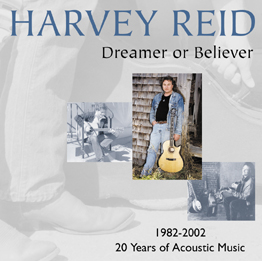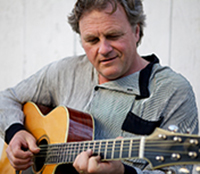|
|

Reviews of "Dreamer or Believer" by Harvey Reid
Boston Herald (Sept 15, 2002)
by Dan Gewertz (read the full interview)
Harvey Reid's guitar gifts are so extraordinary, a description of the veteran
New England folksinger and musician has to start with his mastery of every acoustic
style from bluegrass to blues, reels to ragtime, Celtic hornpipes to J.S. Bach
minuets. Add banjo, mandolin, autoharp, lap steel and bouzouki to the mix, and
call Reid a truly rare string-wizard.
Yet Reid's role as music businessman is equally unusual. One of the first folk
artists to produce a self-released, independent CD, Reid's own label, Woodpecker
Records, has released 16 albums in 20 years, sold nearly 100,000 copies, and
achieved a digital sound so fine that audio companies have used his product
to demonstrate their speakers. He also helped design the Acoustic Blender amp
system for Fishman Transducers, wrote a college textbook, "Modern Folk
Guitar," that is still in print after 22 years, and invented a "partial"
guitar capo technique that is slowly gaining popularity.
Reid has not only avoided the corporate music industry for 28 years, he's also
never held down a "real job." "I was a lifeguard when I
was 16, but for the last 28 years, music has been my life, starting when I was
a street-musician, and then traveling, living in my van for five years,"
said Reid, who plays Club Passim on Friday. "It's pretty hard to understand
where I got the energy to live in my car and struggle so hard for so long. But
luckily, things got easier and better." Reid's formative music years were
spent in the fertile bluegrass scene of Washington D.C. In 1979, at 25, he left
a job teaching guitar at the University of Maryland, and, intent on playing
for a living, moved to New Hampshire, to gig on New England's "blue collar
folk circuit." "I spent many years playing five to six nights a week,
learning my trade," he said. Now a resident of York, Maine, Reid has just
released a retrospective double-CD, "Dreamer or Believer," that not
only traces his 20 years as an independent recording artist, but has unearthed
one song and one instrumental tune recorded in each of those years. With his
deep knowledge of traditional genres, and his ability to write new music that
sounds ancient, Reid's 155 minute CD-set defies musical trends and attains a
timeless grace.
The disc of instrumentals can be so refined that the untrained voice and amused
spontaneity of the vocal disc comes as a surprise. Many of the songs are culled
from Reid's huge collection of tapes from solo gigs and radio shows. There are
a three recent songs with Joyce Andersen, the fine fiddler/singer who now shares
a musical and personal life with Reid. The guitarist does not regret the time
he spends on the business side of music. "Since I never get enough time
to play, I'm not worn out or bored with it when I get on stage. By making more
money selling records, I can play fewer tour dates, have more of a life, and
not get burned out. I'm in control of my life, I earn a good living, and I am
not blaming anyone. That's something not many artists can say."
Reid's long history with independent recording began without a plan. Rejected
by such labels as Rounder and Tacoma, he just decided to try one album on his
own. "I have always seen myself as more like a potter or a crafts artisan
than a star," he said. "I make hand-crafted stuff that is quite unlike
what the big stores sell, and there are enough people that appreciate the difference
that I can earn a living." The independent route has left Reid with a few
frustrations and an obvious sense of achievement. "I can wonder why I've
remained on the fringes. I can also be thankful that I have a faithful audience
who've fed me for so long. And I haven't become jaded. When I'm old and on life
support, I'll have fewer regrets than the guy in the next bed who didn't follow
his dreams." (Harvey Reid at Club Passim, Cambridge, Fri. 8 p.m. $12.
Portsmouth Herald (Sept 19, 2002
) by Chris Elliott (read the full
interview)
Harvey Reid founded Woodpecker Records and released his first recording in
1982 using Portsmouth as his base of operations. Twenty years and 16 album releases
later, he maintains a primary affiliation with the New Hampshire Seacoast, and
seems happy enough with his career and his environs to stick around a while
longer. Reid's most recent release on Woodpecker Records is a double CD titled
"Dreamer or Believer," a retrospective collection that features one instrumental
and one song with vocals from each of his 20 years of making music. The most
striking aspect of listening to this enchanting recording is the consistency
of the sound and spirit of the discs throughout. Perhaps the fluency of the
playing and the quality of the recording improve incrementally as the listener
steps through the chronology, but the original vision of instrumental excellence,
well-digested musical history, and good humor remains true throughout. This
recording gets a "wow" from this desk, and even for the Reidophiles out there,
it is a recording worth having in the rack, as half of the songs in this collection
are either previously unreleased or long since out of print. The instrumental
disc is nonpareil, especially if you can resist forwarding through the autoharp
tunes. To a listener unaccustomed to the autoharp as an instrument of pleasure
rather than one of torture, the first four bars of the autoharp numbers sound
like a toy piano being thrown down a flight of stairs, but once a listener adjusts
to the timbre, the mastery of the playing is breathtaking. After the primal
recollections of your third-grade homeroom subside, this instrument, which is
rarely played outside grammar-school introduction-to-music classes, becomes
plaintive and soulful in the hands of this master musician. The vocal disc in
this dual release reveals Reid's excellence in both performance and songwriting.
His vocal accomplishment on the opening cut recorded live at The Puddledock
Pub in Portsmouth in 1982, "I've Been Everywhere" is stunning. It is 6 1/2 minutes
of singing and talking and playing worthy of Arlo Guthrie, David Bloomberg or
any of music's greatest solo entertainers. The title track, "Dreamer or Believer"
is an evocative portrait of the stoicism of the rural poor, as fine a rendering
of that motif as almost anything you'll find in the bluegrass canon. And it's
worth the price of admission to hear Reid sing his now 17-year old lyric "Those
crazy years of youth / I thought they would never end / Gone now forever / Slipped
through my hands." On Sunday, Sept. 22, Reid celebrates his career milestone
with a performance at the Unitarian-Universalist Church, South Church, 292 State
St., Portsmouth, at 7 p.m. The concert is the first in a series of CD releases
scheduled to take place in Reid's many music markets. One can look at Harvey
Reid as an accidental soothsayer of sorts. Both his business model and his sound
have come into vogue in recent years. When he first embarked upon his musical
and business journey, his sound was virtually unmarketable and his in-house
approach to booking, recording and distribution relatively untested. "I became
independent in the days when labels laughed at acoustic music," Reid says. "They
were dropping Bonnie Raitt and John Prine when I made my first record. I did
get rejected by the labels at the time, and I knew I needed a record, so I made
my own." The other way to look at Reid's career is precisely opposite, and that
seems to be the way Reid looks at it. According to Reid, the tradition of self-promotion
is as old as Ralph Stanley. "I came from the bluegrass world, and people have
always made their own records in that world, since it was never popular enough
to warrant industry interest." Reid peddles his business acumen as the child
of necessity, but the fact is he has a profound talent for organization, promotion
and communications. It might be suggested that if he hadn't been cursed with
such a love and talent for music and had applied himself to boardrooms instead
of concert halls, he'd probably be a wealthy man by now. Reid maintains a detailed
and informative newsletter and a Web site, promotes other musicians' events,
interviews tirelessly, maintains gear and manages a mail-order sales vehicle.
The fact that it doesn't impinge on the integrity of the writing, recording
and performance is impressive. "I guess I'm like the frog in the saucepan who
doesn't jump out when it gets too hot gradually. If you handed me a list of
all the things I do and said, 'Do all this,' I would think you were nuts, but
it has all evolved slowly. First it was a calendar, then a phone machine, and
you gradually get in deeper." Having fired his guns in the time of the Sex Pistols,
gone head to head with Duran Duran, played steel guitar in the face of heavy
metal, and written thoughtful lyric as the oxymoron of rap music dominated the
charts, Reid's survival seems a statistical improbability. Against all conventional
wisdom on what the music business is, Reid is an American success story. He
is as busy as he wants to be, financially independent, and has never had a job
in the traditional sense of the word. All of this his been created and managed
by Reid, and he looks forward to another 20 years of making music in the Seacoast
area, across the country and all over the world.
Showcase Magazine (Foster's Daily Democrat, Dover NH (Sept
19, 2002 ) by Chuck Ginsberg
Showcase Magazine - Feature Story Thursday, September 19, 2002
A Harvey Reid retrospective: From vinyl to CD: Portsmouth concert planned for
Sunday
By CHUCK GINSBERG Special to Showcase ginziret@greennet.net
Dreamer or Believer celebrates the 20th anniversary of Harvey Reid’s first
LP release (1982). The York, Maine resident, a superb singer/songwriter and
multi-instrumentalist, chose his "best known song" as the title for
his 16th album. He is ably abetted by a fine and varied cast of fellow acoustic
musicians.
The retrospective will be unveiled locally at a Sept. 22, 7 p.m., concert at
the Unitarian Universalist Church in downtown Portsmouth. The date is the second
in a series of six CD release concerts in the tri-state area (New Hampshire,
Maine, and Massachusetts).
The working title had been "Slipped Through My Hand," a song that
"has been reappearing in my life for all these years," Reid says.
In the end, the "shorter and more positive" song won out. "Dreamer..."
he says, "makes a comment about my whole career." Both, like many
of the double CD’s cuts, are about "looking backwards." The tracks,
one instrumental and one song each from his years of recording, showcase a diverse
array of music, lasting more than two and one-half hours. Half of that music
is currently out of print, making the release a bonanza for nouveau Reid fans.
The weeding out process was difficult. Some years yielded a rich harvest of
music, others, only "some cassettes of bar gigs." Reid also wanted
to "cover all the bases of styles and instruments."
The discipline of sticking to the concept forced him to dig through his tape
collection. In the course of digging, he rediscovered "a lot of things
I didn’t know I had." Admitting "some of the live stuff is a
little ragged," yet "real...fun and alive...it tells the story."
He favors having the artist "undress a little in front of the camera, so
to speak."
The instrumentals are a mixture of traditional tunes and Reid originals, with
the final one a step Bach-ward for the "Minuet in G." To give a flavor
of the album’s diversity, "Wildwood Flower" opens, an old country
and western song. Reid then trips delicately through "The Mockingbird"
and a haunting Hawaiian- tinged "Lorena" before the restrained lead-in
to "Fiddle Tune Medley" turns more frolicsome. A tartly sweet "The
Streets of Fyvio" ends the first segment of traditional melodies. The next
four cuts are Reid’s own, relaxing and mysterious, briskly adventurous,
mellow yet deep, and, finally airily appropriate in "Prelude to the Minstrel’s
Dream." Reid’s own take on "Arkansas Traveler" is fun, fingers
joyfully dancing over strings. Those same talented extremities come crashing
to earth for the somber notes in his beautifully rendered "Unknown Soldier."
He follows up with jaunty plucking that buoys the spirits as he is "Crossing
the Badlands." Reid haunts again in his superb version of "Wayfaring
Stranger," but changes pace with "Pieces of Eight," and the sprightly
"Five Cent Cigar," both splendid originals. A traditional Celtic medley,
next on the menu, pairs wistful and sporty. Reid’s "The Lucky Penny"
strikes just the right light note of a penny’s worth, before a medley of
traditional gospel tunes, alternately reverent and joyous. Leading up to the
Bach finale, Reid salutes the mythical steed "Pegasus," a poignantly
painted, penultimate piece that leaves the rapt listener with a vivid vision
of the local string wizard bent over his instrument, oblivious to his surroundings.Harvey
Reid is a master of all the strings he surveys. We sat mesmerized through three
playings of the instrumentals before reluctantly moving on to the songs, another
mixture of traditional melodies and Reid originals, with two covers interspersed.
Again, Reid demonstrates his versatility, serving up a heavy dollop of storytelling
folk, with and without humor, leavened by splashes of blues, and even a little
bluegrass.
The opening cover of Geoffrey Mack’s "I’ve Been Everywhere,"
was not a favorite and the traditional "Matchbox Blues" lacked the
angst we sought in a blues song. Perhaps, it was a letdown from the near perfection
of the previous CD. From that point on, the song portion picked up momentum.
We loved Reid’s "The Flower of Loudoun County," a genuine folk
tune about "mis-caste" ("he’s not our kind") love in
the rural Carolinas. It has all the trappings of a Southern tragedy d’amour,
including doleful melody. It lacks only a murder/suicide. "Slipped Through
My Hand" is a thoughtful mood-enhancing lament on the passage of time and
opportunities we let slip by. The muted clapping at the end of a live performance
seemed the perfect touch. "Barbara Allen" was, as always, a treat,
but "Feelin’ Lowdown," washboard blues from the ‘40s, is
a real change of pace and wake-up call. Back to the atmospheric, Reid’s
"Candlelight" filters life through flickering flames in the darkness.
Our only complaint was the brevity of the song, barely over two minutes.
Somebody put the banjo on fast forward for "Lonesome As Can Be," a
trip through the "high lonesome" sound. Reid was playing bluegrass
when it was a black sheep for most music fans. It shows. "Dreamer or Believer,"
sums up the career of the nonpareil multi-instrumentalist, a believer who realized
his dream, making a comfortable living through his first love. His theme needs
few alterations to fit the York resident like the proverbial glove. The next
three cuts are Reid originals. "Missing A Train" likens love’s
misadventures to coming late to the station, and "Circles" is a meditation
on the paths of life, the never ending, omnipresent circles surrounding one’s
existence. "The Lights of Love" sparkles, describing the shining of
love’s magic in the eyes of man long used to existing in a well of loneliness.
"Sunny Banks of Sweet Deliverance" is a traditional tune, contemplating
what awaits us in the next life. The song is absolutely gorgeous. Lynn Rothermich,
who provides harmony vocals on several cuts, also shines here. J.J. Cale’s
"Call Me the Breeze," a second cover, is a rollicking bluesy number
with Rick Watson prominent on the keyboard. "It’s a Banjo Playing"
starts off the last quintet of songs, all Reid originals from 1997 to 2001,
celebrating the mundane sounds of our every day existence. Beneath its upbeat
tempo beats a heart attuned to the rhythms of life. "This Old Heart of
Mine" is a wistful yet loving reminiscence of years gone by. "Sing
Me a Lullaby" when it comes my time is the narrator’s final request
as he meditates on what will happen when the time comes to get on that boat
for the other shore. "To the Western Wind" is a roving sailor’s
ode to the wild and cold western wind that will call him home on his final voyage;
the wind is his lover and wherever she goes is home. Joyce Andersen accompanies
him on vocals. "Will You Go to the Sea," from the 2001 album, The
Great Sad River, is part of a trilogy of songs about local maritime history.
The song is a reminder of the sea’s fickleness and how it separates lovers,
perhaps for eternity. Andersen also vocalizes on this cut.
Reid describes his work as "getting richer," his rhythms as "getting
steadier," and his compositions as "more complex," with the passage
of time. But, he points out accurately, his output has been "remarkably
consistent," without "huge differences over the years." The "durability"
of his "long ago" work gives Reid a "pretty satisfying feeling."
If you are a Reid fan, you will have to have the album. If you haven’t
been a Reid fan, you will be when you hear Dreamer or Believer. The retrospective
combines impeccable performance, high quality sound, and the legendarily single
minded Reid’s attention to detail, burnished over the years.
FACE Magazine (Maine) (Oct 3,
2002 ) by Dale Robin Lockman (read
the interview)
Coming soon...
|
 H
H

 H
H
